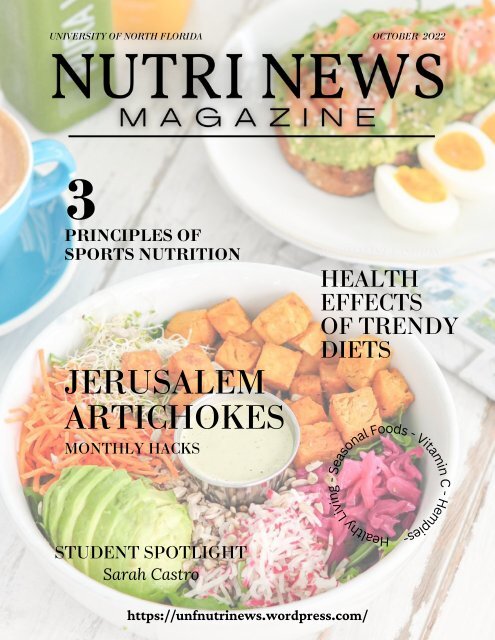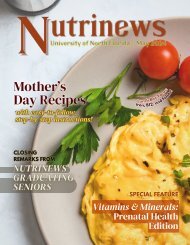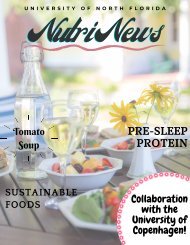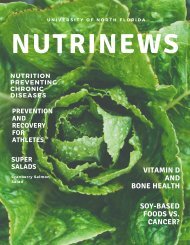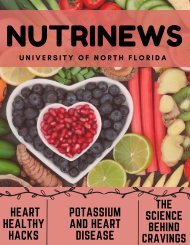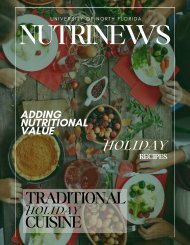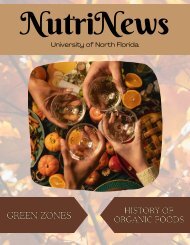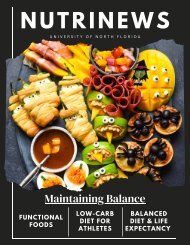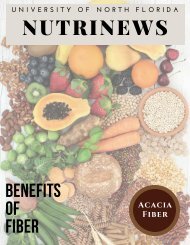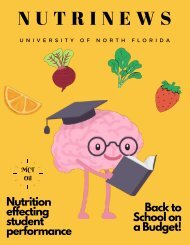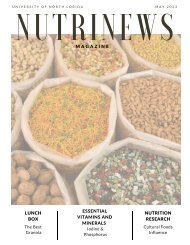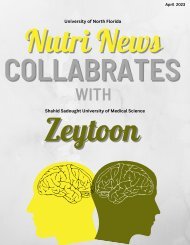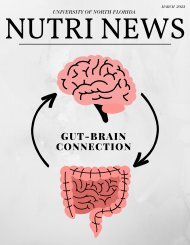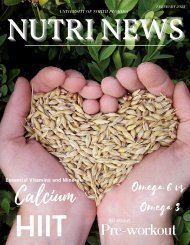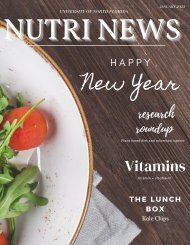NUTRI NEWS October 2022
In this month issue, you will find articles about the research of psychosomatic medicine for treating nutrition problems, why should you shop in season, and where to go to get produce from local sources here in Jacksonville. You will also find delicious recipes in the lunch box, shopping seasonally articles, the groundbreaking evidence regarding the difference between caffeine in coffee and caffeine in tea. Other articles include the truth behind organic foods, the three principles of sport nutrition, and the health effects those trendy diet your favorite Instagram influencer recommends. This month’s student spotlight is Sarah Castro on page 7. Additionally, our faculty spotlight this month could not be a better fit for this issue, Dr Casey Colin! She explains how underneath every single aspect of human health there a nutrition influence. She also goes over some tips for upcoming nutrition students and the ones about to enter the field. You won’t want to miss this interview. If you are looking to make an impact on campus as well as in the community, look for the fliers highlighting volunteer opportunities. These amazing programs are always looking for more volunteers. It is amazing the difference we can make when we all work together for a better and healthier tomorrow. Happy reading!!
In this month issue, you will find articles about the research of psychosomatic medicine for treating nutrition problems, why should you shop in season, and where to go to get produce from local sources here in Jacksonville. You will also find delicious recipes in the lunch box, shopping seasonally articles, the groundbreaking evidence regarding the difference between caffeine in coffee and caffeine in tea. Other articles include the truth behind organic foods, the three principles of sport nutrition, and the health effects those trendy diet your favorite Instagram influencer recommends. This month’s student spotlight is Sarah Castro on page 7.
Additionally, our faculty spotlight this month could not be a better fit for this issue, Dr Casey Colin! She explains how underneath every single aspect of human health there a nutrition influence. She also goes over some tips for upcoming nutrition students and the ones about to enter the field. You won’t want to miss this interview.
If you are looking to make an impact on campus as well as in the community, look for the fliers highlighting volunteer opportunities. These amazing programs are always looking for more volunteers. It is amazing the difference we can make when we all work together for a better and healthier tomorrow. Happy reading!!
You also want an ePaper? Increase the reach of your titles
YUMPU automatically turns print PDFs into web optimized ePapers that Google loves.
UNIVERSITY OF NORTH FLORIDA<br />
OCTOBER 2O22<br />
3PRINCIPLES OF<br />
SPORTS <strong>NUTRI</strong>TION<br />
JERUSALEM<br />
ARTICHOKES<br />
MONTHLY HACKS<br />
MINIMALIST FASHION:<br />
HEALTH<br />
EFFECTS<br />
OF TRENDY<br />
DIETS<br />
STUDENT SPOTLIGHT<br />
Sarah Castro<br />
Healthy Living - Seasonal Foods - Vitamin C - Hempies-<br />
https://unfnutrinews.wordpress.com/
Table of Contents<br />
3<br />
INTERNATIONAL<br />
COLLABORATION<br />
Psychosomatic<br />
Medicine, an approach<br />
for treating nutrition<br />
problems<br />
11<br />
MYTHBUSTING<br />
Is Organic really better?<br />
18<br />
FACULTY<br />
SPOTLIGHT<br />
An interview with<br />
Dr. Casey Colin<br />
5<br />
MONTHLY HACKS<br />
Why Shop in Season?<br />
13<br />
THE LUNCH BOX<br />
Hempies<br />
21<br />
SHOPPING IN SEASON<br />
Jerusalem Artichokes<br />
7<br />
STUDENT SPOTLIGHT<br />
Sarah Castro -Brooks 10 and<br />
Meals on Wings<br />
14<br />
<strong>NUTRI</strong>TION<br />
RESEARCH<br />
Is the effect of caffeine in<br />
coffee and tea the same?<br />
25<br />
SPORTS <strong>NUTRI</strong>TION<br />
The three principles of sport<br />
nutrition<br />
28<br />
FOOD SCIENCE<br />
The health effects of<br />
trendy diets<br />
40<br />
34<br />
YOUR ESSENTIAL<br />
GUIDE TO VITAMINS<br />
AND MINERALS<br />
Vitamin C<br />
36<br />
FNCE <strong>2022</strong><br />
<strong>NUTRI</strong><strong>NEWS</strong><br />
STAFF<br />
Meet our staff!<br />
Follow us!<br />
@unfnutrinews<br />
https://unfnutrinews.wordpress.com
INTERNATIONAL COLLABORATION<br />
PSYCHOSOMATIC MEDICINE, AN<br />
APPROACH FOR TREATING <strong>NUTRI</strong>TION<br />
PROBLEMS<br />
<br />
Written by:<br />
Torres-Reyes Daniel1 and Márquez-Sandoval Fabiola1<br />
Doctorado en Ciencias de la Nutrición Traslacional, Centro Universitario de Ciencias<br />
de la Salud (CUCS), Universidad de Guadalajara (UdeG), Guadalajara 44320, Mexico<br />
Research is an orderly search for an answer to a specific question.1 It is based on the scientific method,<br />
which is the foundation of any investigation, because it is based on systematized stages (observe, ask,<br />
hypothesize, experiment, and conclude) that allow reporting reliable results that anyone else following<br />
those steps can repeat. 2<br />
Psychosomatic medicine is an important link to consider when investigating what happens during an<br />
illness and how a phenomenon observed in laboratory research could impact humans. Blood pressure, for<br />
example, is a component that affects the entire system and is closely related to the psychosomatic variable;<br />
for instance, it is known that high blood pressure is associated with heart failure, atrial fibrillation, kidney<br />
disease, heart valve failure, aortic syndromes, heart attacks, dementia, and ulcers in the stomach and<br />
duodenum, which damage the normal structure and function of the intestine. 3,4,5<br />
3
It has been investigated that religions, particularly those that include the practice of meditation, have the<br />
potential to control blood pressure, and although meditation is already very helpful because it causes the<br />
release of acetylcholine, which induces cardiac slowing, religion can bring about psychological<br />
relaxation by promoting kindness, forgiveness, a sense of belonging, and security, thus downregulating<br />
hypothalamic activation, and better controlling glucose levels within the body. 6,7,8,9<br />
In the same way as religion and spirituality, there are other variables of the human psyche to consider<br />
when nutrition research is being carried out, since it has been reported that this practices also affect<br />
metabolic parameters. Metabolic syndrome is a group of risk factors, characterized by abdominal<br />
obesity, dyslipidemia, low levels of "good" cholesterol (HDL), hypertension and insulin resistance. 10<br />
According to a recent study, the greater the negative affect perceived by a person, the greater the risk of<br />
developing metabolic syndrome11. People who perceive ethnic discrimination are also at risk,<br />
contributing 7% to the development of this metabolic complication.12 Similarly, in a psychosomatic<br />
field, the risk of developing this syndrome increases in people who show attachment manifestations and<br />
search for affection in their speech as a way of dealing with stress. 13<br />
Thus, taking the time for observing our bodies and the situations we are in will provide us with a more<br />
accurate interpretation of our health and nutrition. Overeating or undereating, eating too slowly or too<br />
quickly, choosing fresh or processed foods, and so on are daily food-nutritional issues that the<br />
population faces on a daily basis and whose relationship with our mind is very present, but we don't<br />
always give ourselves the chance to listen to it.<br />
REFERENCES:<br />
1. Thomas CG. Research: The search for knowledge. In: Research Methodology and Scientific Writing. Springer International Publishing; 2021:1-32.<br />
2. Otzen T, Manterola C, Rodríguez-Núñez I, García-Domínguez M. La necesidad de aplicar el método científico en investigación clínica. Problemas, beneficios y<br />
factibilidad del desarrollo de protocolos de investigación. Int J Morphol. 2017;35(3).<br />
3. Fuchs FD, Whelton PK. High blood pressure and cardiovascular disease. Hypertension. 2020;75(2):285-292. doi:10.1161/HYPERTENSIONAHA.119.14240<br />
4. Lee YB, Yu J, Choi HH, et al. The association between peptic ulcer diseases and mental health problems: A population-based study: a STROBE compliant article.<br />
Medicine (Baltimore). 2017;96(34):e7828. doi:10.1097/MD.0000000000007828<br />
5. Sharma A, Jakhar M, Thakur S. Pacing the ulcer healing by choosing the right diet. World Journal of Pharmaceutical Research. 2021;10(12):550-559.<br />
6. Russo MA, Santarelli DM, O’Rourke D. The physiological effects of slow breathing in the healthy human. Breathe (Sheff). 2017;13(4):298-309.<br />
doi:10.1183/20734735.009817<br />
7. Meng Q, Xu Y, Shi R, et al. Effect of religion on hypertension in adult Buddhists and residents in China: A cross-sectional study. Sci Rep. 2018;8(1).<br />
doi:10.1038/s41598-018-26638-4<br />
8. Seybold KS. Physiological mechanisms involved in religiosity/spirituality and health. J Behav Med. 2007;30(4):303-309. doi:10.1007/s10865-007-9115-6<br />
9. Kuo T, McQueen A, Chen TC, Wang JC. Regulation of glucose homeostasis by glucocorticoids. Adv Exp Med Biol. 2015;872:99-126. doi:10.1007/978-1-4939-<br />
2895-8_5<br />
10. Castro-Barquero S, Ruiz-León AM, Sierra-Pérez M, Estruch R, Casas R. Dietary strategies for metabolic syndrome: A comprehensive review. Nutrients.<br />
2020;12(10):2983. doi:10.3390/nu12102983<br />
4
5<br />
Monthly Hacks<br />
You may be asking yourself why<br />
would I shop seasonally when I<br />
can get any produce I want,<br />
year-round in grocery stores?<br />
Well, shopping seasonally is not<br />
only better for your health, but it<br />
is also better for the<br />
environment and can cut your<br />
grocery costs significantly.<br />
Shopping seasonally has many<br />
benefits for your health this is due to<br />
the way the vegetables are grown<br />
and harvested during certain times<br />
of the year, seasonal veggies are<br />
packed with the highest amount of<br />
nutrients.<br />
Shopping seasonally is also great<br />
for the environment because you<br />
are lessening your environmental<br />
footprint, it takes a greater amount<br />
of time and energy to grow food that<br />
is grown in less-than-ideal climates.<br />
By shopping in season, you are<br />
allowing your fruits and veggies to<br />
take the time they need to grow in<br />
their environment.<br />
By Georgina Brace<br />
Shopping in season also has a<br />
great impact on your wallet. If you<br />
have a few minutes in the grocery<br />
store pay attention to the price of<br />
fruits and vegetables throughout<br />
the year. When produce is in<br />
season, you'll see that you can buy<br />
an abundance of this produce at a<br />
sale price. An example of this is<br />
strawberries, you'll notice<br />
strawberries are in season when<br />
grocery stores do a BOGO (Buyone-get-one).<br />
This is because<br />
when produce is grown on its own<br />
it costs less in labor and time, so<br />
farmers can price them lower.
6<br />
Tips to Shop Seasonally<br />
1. The #NUMBER 1 best way to shop in season is<br />
to visit your local farmers’ market, they will<br />
usually have seasonal produce that they are<br />
growing and harvesting that month. Some<br />
local farmers’ markets that are local to our<br />
area are:<br />
a. Riverside Arts Market- Every Saturday (10<br />
am-3 pm)<br />
Location: 715 Riverside Jacksonville, FL 32204<br />
b. The Jacksonville Farmers Market: Dawn to<br />
Dusk 365 days a year<br />
Location: 1810 W Beaver St, Jacksonville FL<br />
32209<br />
c. Beaches Green Market at Jarboe Park: Every<br />
Saturday, 2-5 pm<br />
Location: 5th St Jarboe Park Neptune Beach, FL<br />
32266<br />
2. Check your local grocery stores for any<br />
deals, these are usually seasonal produce and<br />
the best time to get your hands on this<br />
nutrient-dense produce!<br />
3. Keep a list of seasonal produce for each<br />
season (Spring, Summer, Fall, Winter), and look<br />
out for these produce items!<br />
Riverside Arts Market<br />
Seasonal Produce<br />
for <strong>October</strong><br />
Vegetables: Arugula,<br />
Beets, Broccoli, Brussel<br />
Sprouts, Cabbage,<br />
Celery, Cucumber,<br />
Collard Greens, Kale,<br />
Sweet Potatoes,<br />
Tomatoes, Spinach,<br />
Pumpkins. Squash<br />
Fruits: Apples,<br />
Blackberries,<br />
Cranberries, Grapefruit,<br />
Grapes, Limes, Plums,<br />
and Pears.
Student<br />
Spotlight<br />
What inspired you to pursue your<br />
degree?<br />
I’ve always loved food. I’ve worked in<br />
restaurant management for many years<br />
before realizing I wanted to know how<br />
food affects your body not just how to<br />
cook it. My inspiration came from my<br />
individual health journey. I was struggling<br />
after having children and I was so<br />
frustrated with all the false and<br />
misleading information on the internet. I<br />
started looking into what options were<br />
available for school and careers at UNF.<br />
The Nutrition and Dietetics program stood<br />
out to me and now I’m in my senior year.<br />
Sarah Castro<br />
What activities or hobbies do you<br />
enjoy doing outside of school?<br />
I love being outside, going for a run,<br />
finding a new park with my toddler, or<br />
just hanging out at the beach.<br />
What has been most challenging to<br />
you since beginning your program<br />
here at UNF?<br />
The most challenging factor for me is<br />
balancing home and school. My kids are<br />
very active, and we are always running<br />
around to a practice, tournament, or<br />
family event, so finding time to study or<br />
complete homework outside of school is<br />
difficult.<br />
7
8<br />
What advice would you give to<br />
incoming students entering the UNF?<br />
Be involved in your school community. Get<br />
to know your classmates, volunteer, and<br />
join a club. There are so many great<br />
people and communities within UNF and<br />
having an extra support system is always<br />
helpful.<br />
What has been your favorite class in<br />
the Nutrition and Dietetics Program?<br />
My favorite class so far is Advanced<br />
Nutrition Science, but I think Nutrition<br />
Therapy might win that title once I<br />
complete this semester.<br />
Colorful Salad Prepared by<br />
Meals on Wings Volunteers<br />
What plans and goals do you have<br />
after graduation?<br />
I plan on applying for the MS/DI program<br />
at UNF after completing my BS. My goal<br />
after graduation is to pass the RD exam<br />
and move into a clinical position working<br />
with diabetic patients.<br />
Do you have a favorite inspiring quote<br />
or mantra that you live by and would<br />
like to share with others?<br />
If you can’t beat fear, just do it scared.<br />
What does being part of Brooks 10<br />
entail?<br />
Brooks 10 includes volunteering to events<br />
every semester to share your experience<br />
at UNF and support new and current<br />
students. Brooks 10 members should<br />
represent UNF in a professional manner<br />
and maintain the standards of Brooks<br />
College of Health.<br />
What do you like the most about being<br />
part of Brooks 10?<br />
I like talking with new students and<br />
sharing my experience, giving advice,<br />
and helping them conquer their fears<br />
about their first semester.
What does it mean to be part of Meals<br />
on Wings to you?<br />
Meals on Wings is a great way to give<br />
back to our community and seniors. The<br />
seniors on my route are always so happy<br />
to see us. Many of them tell us about<br />
their children and grandchildren. We also<br />
have a lady that gives us a little bag of<br />
candy every time we see her. When you<br />
volunteer to do something for someone<br />
else there is just a different feeling you<br />
get and an attachment to the work you<br />
are doing because you know it makes a<br />
difference in someone’s day and puts a<br />
smile on their face.<br />
Short Answer Qs<br />
Favorite color? Teal<br />
Favorite color? Teal<br />
Favorite food? Pizza<br />
Favorite food? Pizza<br />
Favorite book? Any motivational,<br />
self-help,<br />
Favorite<br />
or educational<br />
book? Any<br />
book.<br />
motivational,<br />
I most<br />
recently<br />
self-help,<br />
read<br />
or<br />
Atomic<br />
educational<br />
Habits<br />
book.<br />
by James<br />
I most<br />
Clear.<br />
recently read Atomic Habits by James<br />
Clear.<br />
Favorite pastime? Organizing – I<br />
know<br />
Favorite<br />
it sounds<br />
pastime?<br />
weird but<br />
Organizing<br />
when I have<br />
– I<br />
free<br />
know<br />
time<br />
it<br />
I<br />
sounds<br />
love reorganizing<br />
weird but when<br />
a room<br />
I have<br />
or<br />
moving<br />
free time<br />
furniture<br />
I love reorganizing<br />
around<br />
a room<br />
and<br />
or<br />
redecorating.<br />
moving furniture around and<br />
redecorating.<br />
Biggest fear? Passing on bad habits<br />
to<br />
Biggest<br />
my kids<br />
fear? Passing on bad habits<br />
to my kids<br />
Greatest motivation? My kids<br />
Greatest motivation? My kids<br />
9
10<br />
O C T O B E R 1 0 T H<br />
W O R L D M E N T A L<br />
H E A L T H D A Y
11<br />
Myth Busting<br />
Is Organic Really Better?<br />
Written By<br />
Dahnine M oyer<br />
Over the last few years, organic food has spread like wildfire.<br />
Despite higher prices, buying organic is turning from an<br />
alternative into a moral and social responsibility. Organic food<br />
is marketed as healthier, natural, and ethical. What does it<br />
mean when we say organic? There is no global consensus, so<br />
different regions have different definitions and rules. In<br />
general, organic food is farmed without GMO seeds, synthetic<br />
fertilizers, or synthetic pesticides. Instead, organic farmers use<br />
more traditional ways of producing food, like crop rotation,<br />
and use organic fertilizers, such as compost or manure. While<br />
the motivation to buy organic food is clearly noble, can we<br />
still purchase conventionally grown?<br />
Is organic food healthier? One idea associated with organic<br />
crops is that their organic cultivation is supposed to make<br />
them more nutritious and healthier. Indeed, several studies<br />
have found that organic foods contain more antioxidants.1<br />
Plants produce them as a sort of homemade pesticide. Organic<br />
plants must work a bit harder, while regular plants have<br />
plenty of help from humans and pesticides. Antioxidants are<br />
believed to have many health benefits.2
What about organic being more nutritious? Well, the<br />
evidence is mixed.3 Some studies have found that organic<br />
food can have slightly higher concentrations of vitamin C and<br />
omega-3 fatty acids. The differences between organic and<br />
conventional for nutritional value is small. So, from a<br />
scientific view, organic foods do not have significant health<br />
benefits. What we do know is that eating fruits and veggies of<br />
all types is good for you, and most of us do not do that enough.<br />
Eating fruits and veggies is more important for your health<br />
than how they were produced.<br />
Is organic food more natural? 3 People do not only buy<br />
organic to get extra vitamins and polyphenols, but to avoid<br />
something toxic, such as pesticides and artificial fertilizers.<br />
Studies have shown that there is less pesticide residue on<br />
organic produce. This is where things get complicated. Less<br />
pesticide does not mean non at all. While pesticides are<br />
supposed to be a last resort in organic farming, they are not<br />
forbidden. Most of these pesticides are natural toxins, like<br />
oils, sulfur, and copper sulfates. Toxic is toxic no matter if the<br />
substance is manufactured or derived from nature. However,<br />
the pesticides on your fruits and veggies are nothing to lose<br />
sleep over. Washing fruits and veggies thoroughly with a<br />
water and baking soda mixture cleans well. Mix 1 teaspoon<br />
of baking soda for every 2 cups of cold water, and let it soak<br />
for 12-15 minutes.4<br />
People want to do the right thing for the health of their<br />
children and the well-being of the plant. Our instinct is to<br />
think of organic as good and conventional as bad, which can<br />
get in the way of making the most reasonable decision. The<br />
solution could be to stop seeing organic and conventional<br />
farming as irreconcilable. They both have pros and cons, and<br />
the best way to produce healthy food efficiently would be a<br />
combination of their best features. If you simply want to eat<br />
healthy, you should buy more fruits and veggies of any kind,<br />
not necessarily organic. Do your best to buy local food that is<br />
in season. What you eat is much more important than how it<br />
was grown.<br />
Resources<br />
1. Crinnion WJ. Organic foods contain higher levels of certain nutrients, lower levels of pesticides, and may provide health<br />
benefits for the consumer. Altern Med Rev. 2010;15(1):4-12. https://pubmed.ncbi.nlm.nih.gov/20359265/<br />
2. Yang CS, Ho CT, Zhang J, Wan X, Zhang K, Lim J. Antioxidants: Differing meanings in food science and health science. J<br />
Agric Food Chem. 2018;66(12):3063-3068. doi:10.1021/acs.jafc.7b05830<br />
3. Smith-Spangler C, Brandeau ML, Hunter GE, et al. Are organic foods safer or healthier than conventional alternatives?: a<br />
systematic review: A systematic review. Ann Intern Med. 2012;157(5):348-366. doi:10.7326/0003-4819-157-5-201209040-<br />
00007<br />
4. How to Wash Vegetables and Fruits to Remove Pesticides. Food Revolution Network. Published December 1, 2017.<br />
https://foodrevolution.org/blog/how-to-wash-vegetables-fruits/<br />
12
The Lunch Box:<br />
HEMPIES<br />
This month we will take a look at a fan<br />
favorite amongst the nutrition and<br />
dietetics senior class...<br />
Written By;<br />
Kate Overby<br />
You may find us munching away on<br />
them during lecture!<br />
Ingredients<br />
-1/3 + 2 tsps. peanut butter (we recommend<br />
using one that has only peanuts and sea salt<br />
in it!)<br />
-2 tsps. maple syrup<br />
-¼ tsp vanilla extract<br />
-2 tsps. hemp hearts<br />
-½ cup brown rice cereal (can also use brown<br />
rice cacao crisps for some added sweetness)<br />
-¼ cup Dairy-free chocolate chips (dark<br />
chocolate preferred)<br />
Recipe<br />
1.Mix peanut butter, maple syrup, vanilla, hemp hearts, and brown rice crisps in a large<br />
bowl.<br />
2.Pat mixture into a small pan<br />
3.Melt chocolate chips in the microwave using 30 second intervals in a microwave safe<br />
bowl, stirring between until all chips are melted smooth.<br />
4.Spread melted chocolate onto the crisp rice and peanut butter base.<br />
5.Place in the freezer for 30 minutes.<br />
6.Cut into squares and store in the freezer.<br />
*This recipe serves 2. For a family size batch, adjust recipe ratios!<br />
13<br />
Resources<br />
: https://mymeals.earthyandy.com/recipe/6025ce09b6c8c2e513dae8e3
14<br />
Is the effect of caffeine in<br />
coffee and tea the same?<br />
In the morning, we all reach for that pick-me-up cup of Joe to<br />
get our day started. For some people, this means starting the<br />
day off with a piping-hot cup of tea instead of Americans’<br />
usual coffee. This switch may be done because of the<br />
perceived effects coffee and caffeine have on our bodies. Even<br />
though caffeine is the most consumed and studied stimulant,<br />
most people who drink it don't really know how it affects<br />
them. Is the switch from coffee to tea to avoid that caffeine<br />
really the solution? Are these two hot breakfast drink favorites<br />
really all that different in terms of caffeine content?<br />
As the traditional pick-me-up, caffeine has produced a lot of<br />
questions that tabloids are quick to answer. Despite the<br />
backlash that caffeine and coffee always seem to have,<br />
caffeine is deemed typically safe if it is not consumed in high<br />
amounts or over 500mg. As a stimulate,<br />
Sofie Van<br />
Moorleghem
15<br />
caffeine can be moderately addictive, and some<br />
people become reliant on the chemical.<br />
Additionally, with doses of caffeine over 500mg,<br />
people experience symptoms of difficulty sleeping,<br />
anxiety, restlessness, and even chronic headaches<br />
or migraines. Therefore, it is important to monitor<br />
caffeine consumption to ensure that you do not<br />
exceed the recommended caffeine intake for the<br />
day (especially because it is in sodas, iced tea, and<br />
other energy drinks!). Now, this might seem<br />
intimidating, as the public usually has more<br />
caffeine than is in just one cup of hot liquid in the<br />
morning. Yet, to reach the 500mg limit, you would<br />
need 3 to 5 cups of 8oz coffee, so moderation is key!<br />
With 80% of the world having a caffeinated drink<br />
every day, how much caffeine is in a cup of coffee<br />
or tea? Well, caffeine content varies depending on<br />
the way the beverage is prepared and brewed. For<br />
example, even though tea leaves have more<br />
caffeine at 3.5%, they are brewed at a lower<br />
temperature than coffee beans, which have 1.1% to<br />
2.2%. Therefore, coffee has more caffeine per cup.<br />
The amount of caffeine is also dependent on the<br />
temperature of the water and the steep time for all<br />
the drinks! So, a traditional 8oz cup of coffee<br />
contains 95mg of caffeine, with an expresso being<br />
a more concentrated form at 58mg in a 1oz shot. A<br />
traditional 8oz cup of tea of the black variety<br />
contains between 47mg and 90mg, and matcha<br />
(green tea) has more caffeine, ranging between<br />
35mg to 70mg per packet. However, if you want<br />
less caffeine in your tea, steep the drink for a<br />
shorter amount of time to decrease the amount.
16<br />
Aside from the difference in the amount of<br />
caffeine, there is also a difference in the way that<br />
coffee caffeine and tea caffeine affect your body.<br />
Tea contains a protein compound called L-<br />
theanine, which works with the caffeine in tea to<br />
calm and reduce stress without decreasing<br />
alertness effects. Additionally, due to the higher<br />
amounts of antioxidants in tea, there is an<br />
extended period of relaxation and focus because of<br />
slower caffeine absorption. For coffee, the caffeine<br />
is digested and acts quicker than tea, causing<br />
energy to come faster but also leave faster too. This<br />
is because caffeine aids in the release of hormones<br />
that block the neurological parts that cause us to<br />
tire and slowdown.2 Yet, coffee does have some<br />
health benefits, including improving mood,<br />
alertness, athletic performance, and decreasing the<br />
risk of chronic diseases like type 2 diabetes,<br />
dementia, and fatty liver disease.<br />
Coffee and tea are both great beverages to have in<br />
the morning (depending on your situation) and<br />
using them to either get energy for the day or a<br />
quick burst in the moment is great. The most<br />
important thing is to make sure to monitor your<br />
intake and make decisions from there. So, if you are<br />
very concerned about your caffeine intake (or are<br />
pregnant or have a heart condition), consider<br />
switching to a low caffeine tea like white or herbal<br />
and/or switch to a decaf coffee/tea.1 If you like<br />
coffee and tea, you should talk to your doctor if you<br />
are concerned about your caffeine intake.<br />
Otherwise, enjoy your favorite breakfast drink in<br />
moderation!<br />
References:<br />
Wartenberg L. How Much Caffeine Does Tea Have Compared with<br />
Coffee? Healthline. Published <strong>October</strong> 7, 2019. Accessed August 24,<br />
<strong>2022</strong>. https://www.healthline.com/nutrition/caffeine-in-tea-vscoffee<br />
Prini M. Caffeine in Tea vs Coffee - There’s a Difference! Blink Tea.<br />
Published December 20, 2020. Accessed September 1, <strong>2022</strong>.<br />
https://blinktea.com/blogs/news/caffeine-in-tea-vs-coffee-theresa-difference<br />
Lang A. Coffee vs. Tea: Is One Healthier Than the Other? Healthline.<br />
Published September 6, 2019. Accessed September 1, <strong>2022</strong>.<br />
https://www.healthline.com/nutrition/coffee-vs-tea
17
Staff Spotlight<br />
<br />
Dr. Casey Colin<br />
1. Tell us about your background in nutrition<br />
from education to experience and how you<br />
came to be at UNF.<br />
I completed my Bachelor of Science in Dietetics<br />
through South Dakota State University. From<br />
there, I was accepted into a dietetic internship<br />
through the University of South Dakota School<br />
of Medicine. For my very first registered dietitian<br />
nutritionist (RDN) job, I was hired as a retail RDN<br />
for a Hy-Vee grocery store in Sioux Falls, SD.<br />
Although I absolutely LOVED my job at Hy-Vee,<br />
the position was only part-time, and I was<br />
seeking full-time employment in a more clinical<br />
role. I left Hy-Vee to accept a full-time position<br />
with the Veterans Health Administration (VA). In<br />
the VA, I gained invaluable experience in both<br />
outpatient and inpatient clinical dietetics. I<br />
worked at two different VA clinics (in SD and<br />
CO) and my collective VA tenure totaled about<br />
12 years. About 7 years into my career, I decided<br />
to go back to school to get my master’s degree.<br />
I guess I got excited about education, because I<br />
decided to go directly into the Doctorate in<br />
Clinical Nutrition (DCN) program through UNF<br />
immediately after I graduated my master’s<br />
program. During the DCN program, my future<br />
started to unfold. I realized I was ready to share<br />
my clinical knowledge and experience with the<br />
new generation of upcoming RDNs, and I was<br />
fortunate enough to be hired to do exactly that<br />
through UNF as a professor! I am also an RDN in<br />
the US Army Reserve. I initially was an enlisted<br />
truck driver, and eventually I became an officer<br />
in the medical corps. The story of that evolution<br />
is a bit longer, so it will have to wait until<br />
another time!<br />
2. What is a message that you would like the<br />
public to know about the importance of<br />
nutrition?<br />
Despite the continued innovative ideas and<br />
concepts that come from nutrition research, one<br />
piece of advice has always seemed to remain<br />
steadfast: as best you can, try to eat real food<br />
with little processing, and try to eat more<br />
vegetables than anything else. Underneath every<br />
single aspect of human health is a nutrition<br />
influence.<br />
18
19<br />
3. In the field of dietetics, what do you feel has<br />
been a big challenge that you have had to<br />
overcome?<br />
The answer to this question is as much<br />
professional as it is personal for me. Throughout<br />
my career, I have felt compelled to protect and<br />
defend the title and prestige of the RDN<br />
credential. In this world of non-credentialed<br />
influencers and pseudoscientists, nutrition<br />
advice seems to come from anywhere and<br />
everywhere. While I still feel an ethical duty to<br />
update the general public, friends, and family<br />
on evidence-based nutrition whenever I hear of<br />
misinformation, I have come to find some solace<br />
in a paradigm shift. That shift entails me<br />
focusing my efforts on being a better RDN –<br />
carving out time to read, study, and even<br />
conduct new research on nutrition. Rather than<br />
engaging in an argument against<br />
misinformation, sometimes redirecting my efforts<br />
in order to uphold and elevate the value of the<br />
RDN in healthcare and in the eyes of the public<br />
is more fruitful and more peaceful. Gandhi said<br />
we need to “be the change we wish to see in<br />
the world.” If RDNs want to uphold the title of<br />
“the premier nutrition expert,” we actually have<br />
to stay abreast of nutrition research and be the<br />
very best!<br />
4. What advice do you have for students<br />
pursuing a degree in dietetics?<br />
To remember that you are just a beautiful and<br />
flawed human who is about to go out into the<br />
world to help other beautiful and flawed<br />
humans to improve their life through nutrition.<br />
Embrace the awkward moments. Fight to be<br />
your most authentic self and remember to have<br />
compassion for others when they struggle. Your<br />
future patients/clients will appreciate your<br />
knowledge and expertise far more when they<br />
can truly sense that you care.<br />
5. What’s your favorite part about being a<br />
professor?<br />
I knew I would enjoy teaching students, but I<br />
didn’t realize the profound fulfillment I would<br />
feel from this job. As a parent, I am always so<br />
proud when I see my kids soaking in knowledge<br />
and applying it to their world with success.<br />
Now, I get to expand that pride to my students<br />
doing the same things. It is really, really<br />
magical.<br />
6. How do you juggle family life, being a<br />
professor?<br />
Very carefully. Just kidding, but it sometimes can<br />
be a struggle, honestly. I am learning to channel<br />
Stephen Covey’s principles as mentioned on the<br />
Seven Habits of Highly Effective People, and to<br />
set boundaries around things that are not<br />
urgent nor important. I like to map out my week<br />
to prioritize both my personal and professional<br />
tasks and make a rough sketch of what I will do<br />
that week and when. I find this process to be<br />
critical in balancing many life roles. I also<br />
heavily depend on my CrockPot and InstantPot!<br />
7. Can you tell us a fun fact about yourself<br />
that many people may not know?<br />
This was the hardest question to answer! I once<br />
won a free meal every week for a year at a<br />
HuHot Mongolian grill in Sioux Falls, SD, for<br />
winning a recipe contest. I no longer remember<br />
that recipe…I wish I did! It was really yummy.
HAPPY<br />
COLUMBUS<br />
DAY<br />
<strong>October</strong> 10th
21<br />
20<br />
Shopping<br />
in Season<br />
Jerusalem Artichokes<br />
Written by Alicia Scott<br />
Jerusalem artichoke belongs to the<br />
Asteraceae family and originates from<br />
North America despite the name.1 This<br />
plant is known to be resilient to frost,<br />
drought, poor soil, and even pests and<br />
different variations of plant disease. The<br />
history of the crop can date back as far<br />
as before the arrival of the European<br />
settlers because it is said that many<br />
North American Indian tribes used it as<br />
food.2 The name “Jerusalem” is believed<br />
to come from the North American<br />
Pilgrims who thought of it as a new feed<br />
in a “new Jerusalem”. 2 Even though it is<br />
called the Jerusalem artichoke, there is<br />
no relation to the artichoke family at all.<br />
Some fun facts about them are that they<br />
are also called wild sunflower, and there<br />
is another story that the name stems<br />
from Italian settlers who called it<br />
Girasole and that can be translated to<br />
sunflower.<br />
What can you do with Jerusalem<br />
Artichokes?<br />
There are several uses for this plant, the first<br />
one being human consumption. It is described<br />
to have a taste similar to water chestnuts and<br />
is used as a gourmet vegetable.2 The closest<br />
resemblance this vegetable has to any other<br />
vegetable would be a potato. They share<br />
some of the same characteristics as a potato<br />
but when it comes down to the overall<br />
chemistry, roughly 70-80% of the<br />
carbohydrates are in the form of insulin rather<br />
than starch.2 Since they share the same<br />
physical characteristics as potatoes, they can<br />
be prepared the same way, they can even be<br />
eaten raw, made into flour, soup, or even a<br />
breakfast hashbrown. Jerusalem Artichokes<br />
can be used in alcohol production. One<br />
specific country where this is done is France,<br />
and it is used to make wine and beer. It can<br />
also be used to make fructose and even<br />
livestock feed.
22 22<br />
I have added a recipe for crispy Jerusalem<br />
Artichokes courtesy of Alison Roman from<br />
bon appétit.3 They can go with different<br />
varieties of protein such as chicken, fish, or<br />
maybe a type of red meat.<br />
04.<br />
Remove the skillet from heat and<br />
stir in balsamic vinegar, scraping up<br />
any browned bits. Spoon brown<br />
butter sauce and rosemary over<br />
Jerusalem artichoke and serve.<br />
Crispy Jerusalem Artichokes With<br />
Balsamic Drizzle<br />
Ingredients<br />
2 tbsp of olive oil<br />
2 lbs. of Jerusalem<br />
artichokes<br />
4 sprigs of rosemary<br />
½ stick of butter<br />
3 tbsp balsamic vinegar<br />
Kosher salt and pepper<br />
Preparation<br />
Work Cited<br />
Szewczyk A, Zagaja M, Bryda J, et al.<br />
Topinambur - new possibilities for use in a<br />
supplementation diet. Ann Agric Environ Med.<br />
2019;26(1):24-28. doi:10.26444/aaem/102767<br />
Jerusalem artichoke.<br />
https://www.hort.purdue.edu/newcrop/afcm/jeru<br />
sart.html. Accessed August 29, <strong>2022</strong>.<br />
Roman A. Crispy Jerusalem artichokes with aged<br />
balsamic. Bon Appétit.<br />
https://www.bonappetit.com/recipe/crispyjerusalem-artichokes-with-aged-balsamic.<br />
Published <strong>October</strong> 15, 2014. Accessed August<br />
30, <strong>2022</strong>.<br />
01.<br />
Heat oil in a large skillet on medium<br />
heat. Add Jerusalem artichokes and<br />
¼ cup water and season with salt<br />
and pepper. Cover and cook, stirring<br />
occasionally until Jerusalem<br />
artichokes are fork tender.<br />
02.<br />
Uncover the skillet and cook, stirring<br />
occasionally, until water is<br />
evaporated, and Jerusalem<br />
artichokes begin to brown and crisp<br />
then transfer to a plate.<br />
03.<br />
Add rosemary, and butter to the<br />
skillet, and cook, stirring often, until<br />
butter foams, then browns.
23<br />
How can shopping in season<br />
reduce your carbon footprint?<br />
First, let us discuss what is carbon footprint. Carbon footprint is the amount<br />
of greenhouse gasses that includes carbon dioxide and methane that are<br />
generated by our actions.1 The United States has one of the highest rates of<br />
carbon footprint per person in the world coming in at an average of 16<br />
tons.1 Carbon footprint has the greatest effect on climate change because of<br />
the carbon dioxide. As we continue to use resources such as fossil fuels and<br />
continue with deforestation, high concentration of greenhouse gases such as<br />
carbon dioxide will threaten a rise in surface temperature on the planet and<br />
this will have life-threatening impacts.<br />
As a people, it is our job to ensure that we are not adding to our carbon<br />
footprint and find ways we can lower it. The main way we can lower our<br />
carbon footprint is by buying locally and in-season products. Seasonal and<br />
local food help to save on fossil fuels because there isn’t a need for longdistance<br />
transport.3 There is also the added benefit that it is fresher and<br />
tastier. It also reduced the need for packaging. When visiting a local family<br />
market, you might find produce in compostable or reusable containers<br />
compared to the single-use plastic you might find at the grocery store. Local
24<br />
armers are also adapting to not using any pesticides<br />
or other chemicals when it comes to planting crops<br />
and that can reduce the amount of air pollutants.<br />
Produce becomes more expensive when it is out of<br />
season because of the sole purpose that it needs to<br />
be imported from the region in the world to grow<br />
year-round.4 This expense is not only seen on the<br />
consumer side, but it is leaving a large carbon<br />
footprint just because of that added transportation.<br />
Take a visit out to your local farmers’ market and<br />
see the variety of fruits and vegetables they have<br />
that are currently in season.<br />
Work Cited<br />
What is your carbon footprint? The Nature Conservancy.<br />
https://www.nature.org/en-us/get-involved/how-tohelp/carbon-footprint-calculator/.<br />
Accessed August 30, <strong>2022</strong>.<br />
What is a carbon footprint? What is a carbon footprint?<br />
https://www.conservation.org/stories/what-is-a-carbonfootprint.<br />
Accessed September 1, <strong>2022</strong>.<br />
Klemm CS. 6 tips to lighten your carbon Foodprint. EatRight.<br />
https://www.eatright.org/food/planning-and-prep/smartshopping/6-tips-to-lighten-your-carbon-foodprint.<br />
Accessed<br />
September 1, <strong>2022</strong>.
25<br />
THE THREE<br />
PRINCIPLES<br />
OF SPORTS<br />
<strong>NUTRI</strong>TION<br />
B y A s a l A b b a s z a d e h<br />
For an athlete to achieve and maintain optimal<br />
performance, it is essential to have a sound nutrition<br />
plan.1 Sports nutrition professionals have researched<br />
the most effective ways to deliver nutrients by designing<br />
strategies to fulfill nutritional needs. (1,2) Nutrition plans<br />
can vary based on athletes’ differentiating and unique<br />
abilities, backgrounds, sport, and more. However, most<br />
nutritional strategies are composed to focus on three<br />
main principles: fueling, hydration, and recovery. (1-4)<br />
FUELING<br />
Food and fluid consumption before exercise<br />
performance can be a preventative measure for<br />
avoiding later exhaustion, aggressive appetite, or<br />
hypoglycemia.2 Fueling aids the body in managing<br />
appetite and prepares the body and muscles during<br />
exercise performance.(2,4) It is recommended that<br />
athletes eat high-carbohydrate meals that are low in fat<br />
and protein before exercise.2 Typically, 85-200 grams of<br />
carbohydrate during a pre-exercise meal will have the<br />
best reaction on an individual’s energy and overall<br />
strength during exercise performance.2
26<br />
HYDRATION<br />
Staying hydrated is crucial for athletes engaged in competitive sports. It is encouraged that an athlete<br />
hydrate before, during, and after training sessions or competitions. Athletes should consume<br />
sufficient amounts of appropriate fluids to avoid injury, maximize performance, and prevent the risk of<br />
dehydration.3 Sweat, as a result of intense activity, can be the primary catalyst for dehydration.3<br />
Furthermore, a large amount of water and salt loss from sweat can even lead to hypo-hydration,<br />
which may cause heat stroke or heat exhaustion.3 Lost minerals can be easily replaced by<br />
consuming an electrolyte-enriched beverage and replenish the body’s electrolyte losses, such as<br />
sodium and potassium. More commonly used sports drinks that have proven to combat dehydration<br />
and the loss of electrolytes are Gatorade and Pedialyte.<br />
RECOVERY<br />
Intense exercise and long activity can result in depleted substrate stores and loss of energy. (2,4)<br />
Specifically the active skeletal muscle, liver, and adipose tissue may experience metabolic shifts from<br />
exercise, thus making the recovery process essential for replenishing the body.4 Consuming<br />
carbohydrates soon after activity assists the body in replenishing glycogen stores. Additionally, eating<br />
lean protein can aid in tissue repair.4 Other methods of recovery include, but is not limited to,<br />
stretching, rest, catered nutrition plan, and muscle therapy. (2,4) Strategic food consumption can<br />
affect aspects beyond an athlete's physical sustainability, it can also offer insight to an individual’s<br />
mental health.4<br />
References:<br />
1. Spriet LL. Performance Nutrition for Athletes. Sports Medicine (Auckland, N.z). 2019;49(Suppl 1):1-2. doi:10.1007/s40279-018-1027-9<br />
2. Grout A, McClave SA, Jampolis MB, et al. Basic Principles of Sports Nutrition. Current nutrition reports. 2016;5(3):213-222. doi:10.1007/s13668-016-0177-3<br />
3. Maughan RJ, Shirreffs SM. Development of Individual Hydration Strategies for Athletes. International Journal of Sport Nutrition and Exercise Metabolism.<br />
2008;18(5):457-472. doi: 10.1123/ijsnem.18.5.457<br />
4. Lundsgaard AM, Fritzen AM, Kiens B. The Importance of Fatty Acids as Nutrients during Post-Exercise Recovery. Nutrients. 2020;12(2):280. Published 2020<br />
Jan 21. doi:10.3390/ nu12020280
THE HEALTH<br />
EFFECTS OF<br />
TRENDY DIETS<br />
BY ISABELLE BRAZELTON<br />
When to Diet<br />
Amidst all of the craziness in the world,<br />
it’s hard to know the right place to turn<br />
for health, weight loss, and dietary<br />
information. When everyone starts talking<br />
about a new fad diet that works miracles,<br />
it becomes so easy to hop on the train<br />
and give it a whirl. Unfortunately, there’s<br />
a high chance that this trendy new diet<br />
isn’t going to give us the exact results<br />
that we want. Some popular diets can<br />
even be dangerous or harmful if not done<br />
correctly. This being said, there are<br />
definitely some popular diets that may<br />
actually be worth our time trying, if we<br />
stick to them.<br />
The first thing to think about is why you<br />
might want to go on a diet or try a new<br />
dietary trend. Weight loss? More energy?<br />
28
Lower blood pressure? Better memory? Not all<br />
diets will be the right choice; so, don’t just<br />
try something because everyone else is doing<br />
it. Next, analyze if you actually need to go on<br />
a structured diet. We don’t want to jump<br />
through hoops for no reason. Sometimes<br />
eating a balanced diet, living an active<br />
lifestyle, and drinking lots of water is all we<br />
need. If you think you need to try something<br />
more, then it’s time to assess the options!<br />
Diets to Proceed with Caution<br />
Keto: this is a popular low-carb, high-fat diet<br />
that is meant to push the body into a state<br />
know as ketosis.1 While it may be useful in<br />
cutting a few pounds somewhat quickly, it is<br />
more so very dangerous and can lead to lifethreatening<br />
complications when not<br />
implemented correctly. It can additionally<br />
lead conversely to gaining more weight,<br />
raising cholesterol, stressing the kidneys, and<br />
building up acid in the blood (known as<br />
ketoacidosis). While some people with Type 1<br />
diabetes and children with epilepsy may be<br />
prescribed a keto diet, individuals who are<br />
not being monitored by a doctor and have not<br />
been directed to partake in a keto diet should<br />
not attempt it.<br />
Gluten Free: this diet involves avoiding all<br />
items that have gluten in them.2 While<br />
avoiding gluten is not particularly dangerous,<br />
it is also likely not necessary and should<br />
mainly be done by medical discretion.<br />
Contrary to some information circling in popculture,<br />
gluten is not bad for you, and cutting<br />
it out of your diet provides no benefit.Some<br />
positive results that people may see after<br />
cutting gluten from their diet are actually a<br />
29
30<br />
The risks of this diet, however, are<br />
weakness, fatigue, and not receiving an<br />
adequate intake of fiber (causing<br />
constipation) or some nutrients.<br />
Additionally, when not monitored<br />
correctly, a low enough carbohydrate<br />
intake can result in ketosis, as<br />
mentioned above. Once again, it is best<br />
to talk with a doctor prior to<br />
attempting this diet.<br />
result consuming less processed foods,<br />
rather than not consuming gluten. This<br />
is, of course, unless you have Celiac<br />
disease or a gluten related allergy.<br />
Celiac disease is an autoimmune<br />
disorder in which the lining of the<br />
small intestine becomes inflamed and<br />
damaged when the protein gluten is<br />
consumed. Those who do not have this<br />
or any other related condition will not<br />
have any positive effects from removing<br />
gluten from the diet.<br />
Atkins: this low-carb diet has been<br />
around since the 60s’ and resembles a<br />
less extreme, more reasonable, and<br />
more manageable version of the keto<br />
diet, focusing primarily on consuming<br />
fats and proteins and limiting<br />
carbohydrates.3 The main goal of this<br />
diet is to help you lose weight<br />
and have more energy. By limiting<br />
intake of carbohydrates to be under a<br />
specified amount, many sugary,<br />
processed foods are cut out, making<br />
weight loss much easier.<br />
Vegan/vegetarian: these diets involve<br />
eliminating animal products from the<br />
diet, and are renowned for being<br />
healthy and sustainable.1 While it’s<br />
true that there are many benefits to<br />
practicing a vegan or vegetarian diet,<br />
this is only the case when they are<br />
done properly and with expert<br />
planning. These diets are known to be<br />
linked to lower cholesterol, lower<br />
inflammation, and lower risk of heart<br />
disease due to their high fiber/low-fat<br />
nature. However, there are some<br />
essential nutrients that are found<br />
primarily in animal products, such as<br />
complete proteins and vitamin B12,<br />
making it important to find alternative<br />
ways to obtain these nutrients in order<br />
maintain a healthy diet. With proper<br />
planning and education, these diets can<br />
be a great choice.<br />
Other Diets to Consider<br />
DASH: this is a heart healthy, low<br />
sodium, high potassium diet that<br />
involves eating lots of fruits,<br />
vegetables, fish, poultry, nuts, and lowfat<br />
dairy and limiting intake of highsugar,<br />
processed foods and alcohol.1 It
is used as a measure to help prevent high<br />
blood pressure, support heart health, and<br />
overall promote the intake of a balanced<br />
and healthy diet. One big thing to note,<br />
however, is that some salt is still needed<br />
in a healthy diet, so individuals must be<br />
careful to never completely remove salt<br />
from their regular food intake, as this<br />
could cause serious complications.<br />
Mediterranean: this is another diet that<br />
promotes a high intake of fruits and<br />
vegetables, as well as nuts, seeds, grains,<br />
beans, fish, and some poultry.1 It also<br />
limits high-sugar, processed foods and<br />
dairy products, with olive oil being a<br />
primary source of fat. Overall, the<br />
benefits of this diet include protection<br />
from cognitive decline and reduced risk<br />
of several diseases such as heart disease,<br />
diabetes, Parkinson’s, and some cancers.<br />
The biggest issue that may arise from this<br />
diet is the risk of a vitamin D deficiency,<br />
being as dairy is a primary source of<br />
vitamin D. This can be avoided through<br />
adequate sun exposure and proper<br />
supplementation.<br />
MIND: this is an exciting, up and coming<br />
diet that operates as a combination of the<br />
DASH and Mediterranean diets with a<br />
focus on combating Neurodegenerative<br />
Delay.4 Its goal is to improve brain health<br />
and serve as protection from diseases<br />
such as Alzheimer’s. The general<br />
guidelines for this diet are to focus on<br />
plant-based foods, limit processed foods<br />
and foods with added sugar, and limit<br />
animal-based foods that are high in<br />
saturated fats.<br />
31
Flexitarian: this is a very balanced and<br />
healthful diet that is still filled with lots of<br />
freedom, variety, and food options; it focuses<br />
on eating a healthful diet of primarily plantbased<br />
products with minimal intake of animal<br />
products.5 The charm of this diet is that you<br />
are able to reap most of the positive benefits<br />
of a vegan/vegetarian diet without being at<br />
risk for some of the potential negatives<br />
(vitamin deficiency, inadequate protein<br />
intake, multiple restrictions). This is a great<br />
diet for those who want to lose weight and<br />
eat an overall healthy diet without feeling<br />
overly limited or restricted. Additionally, this<br />
is a great starter diet for individuals who<br />
would like to ultimately work their way to<br />
becoming fully vegan or vegetarian.<br />
References<br />
9 diet fads to try (or skip completely) in <strong>2022</strong> | Diet<br />
and Nutrition | Prevention | UT Southwestern<br />
Medical Center. Utswmed.org.<br />
https://utswmed.org/medblog/diets-best-andworst/.<br />
Published <strong>2022</strong>. Accessed August 30, <strong>2022</strong>.<br />
The good news is that you don't have to go grainfree.<br />
Mayo Clinic.<br />
https://www.mayoclinic.org/healthylifestyle/nutrition-and-healthy-eating/indepth/gluten-free-diet/art-20048530.<br />
Published<br />
<strong>2022</strong>. Accessed August 30, <strong>2022</strong>.<br />
Atkins Diet: What's behind the claims?. Mayo Clinic.<br />
https://www.mayoclinic.org/healthy-<br />
lifestyle/weight-loss/in-depth/atkins-diet/art-<br />
20048485. Published <strong>2022</strong>. Accessed August 31,<br />
<strong>2022</strong>.<br />
What to Know About the MIND Diet. WebMD.<br />
https://www.webmd.com/alzheimers/what-to-knowabout-mind-diet.<br />
Published <strong>2022</strong>. Accessed August<br />
31, <strong>2022</strong>.<br />
Flexitarian Diet Review: Less Meat and Weight<br />
Loss?. WebMD. https://www.webmd.com/diet/az/flexitarian_diet.<br />
Published <strong>2022</strong>. Accessed August<br />
31, <strong>2022</strong>.<br />
32
Volunteers needed<br />
Give back to your community by preparing nutritious meals for<br />
seniors at the UNF Center for Nutrition and Food Security. Interested?<br />
Send your N# to cnfs@unf.edu
Your Essential Guide to<br />
Vitamins and Minerals<br />
This month is Vitamin C!<br />
By Sofie Van<br />
Moorleghem<br />
Vitamins and minerals play a big role in<br />
all our lives, whether we know it or not,<br />
and vitamin C is no exception. Every<br />
spring, when flu season rolls around, we<br />
hear lots of talk about oranges and the<br />
role that vitamin C plays in keeping those<br />
nasty colds away. So, after popping an<br />
Emergen-C, we go on about our daily<br />
lives without thinking about all the things<br />
that little pill is doing for our immune<br />
system. Well, despite what the packaging<br />
says, vitamin C does a lot more for our<br />
bodies than just keep the flu season at<br />
bay, and it is important to make sure that<br />
this vital nutrient is a part of our daily diet<br />
and health.<br />
The recommended daily allowance or<br />
RDA for vitamin C is 75mg for women and<br />
90 mg for men. Vitamin C is in so many<br />
foods that being deficient is very<br />
uncommon and hasn’t been seen<br />
in many people other than pirates. Scurvy<br />
or vitamin C deficiency often presents<br />
with easy bruising, rough skin, tooth loss,<br />
etc.²<br />
Some of the foods that are<br />
high in Vitamin C include:¹<br />
Citrus, of course, such as<br />
-Oranges<br />
-Lemons and Limes<br />
-Grapefruit<br />
Kale<br />
Cantaloupe<br />
Kiwis<br />
Broccoli<br />
Strawberries<br />
Yellow and Chili Peppers<br />
And Many, Many More!<br />
34
35<br />
All these symptoms happen during<br />
deficiency because vitamin C is<br />
interconnected with many systems of<br />
the body, including the skin, bones, and<br />
brain.3 As a potent antioxidant, vitamin<br />
C helps protect against the buildup of<br />
toxic substances in the body and can<br />
prevent the formation of chronic<br />
disease. Vitamin C also helps with the<br />
formation of collagen, which is used to<br />
build cells, repair cellular damage,<br />
strengthen bones and skin, and heal<br />
wounds.<br />
Now to explain the number one reason<br />
that vitamin C is used by the public.<br />
What is its role in the immune system?<br />
Well, eating an orange when you are<br />
sick might not be such a bad idea<br />
because it does help boost your<br />
immune system in many ways. First, it<br />
boosts production of immune cells or<br />
white blood cells, which increases the<br />
immune system’s defense. Next, it<br />
strengthens and repairs the physical<br />
skin barrier with collagen to further fight<br />
off infection. Lastly, vitamin C works to<br />
decrease inflammation in order to heal<br />
and prevent respiratory and wholebody<br />
infections.⁴<br />
Vitamin C is an all-encompassing<br />
vitamin that packs a potent boost to<br />
many areas of the body. It is not<br />
necessary to take a supplement (unless<br />
your doctor advises it), but it should be a<br />
part of your daily diet. Remember to<br />
keep your immune system (and other<br />
systems) up, even when it is not flu<br />
season!<br />
Resources:<br />
1. Hill C. 20 Foods That Are High in<br />
Vitamin C. Healthline. Published May<br />
9, <strong>2022</strong>. Accessed August 21, <strong>2022</strong>.<br />
https://www.healthline.com/nutritio<br />
n/vitamin-c-foods<br />
2. Julson E. 15 Signs and Symptoms<br />
of Vitamin C Deficiency. Healthline.<br />
Published May 25, 2018. Accessed<br />
August 21, <strong>2022</strong>.<br />
https://www.healthline.com/nutritio<br />
n/vitamin-c-deficiency-symptoms<br />
3. Zelman KM. The Benefits of<br />
Vitamin C. WebMD. Published April 8,<br />
2008. Accessed August 21, <strong>2022</strong>.<br />
https://www.webmd.com/diet/featu<br />
res/the-benefits-of-vitamin-c<br />
4. Carr A, Maggini S. Vitamin C and<br />
immune function. Nutrients.<br />
2017;9(11):1211. doi:10.3390/nu9111211
36
37
38
39
Meet the team<br />
Editor in Chief<br />
Saily<br />
Medero<br />
Co-Editor in Chief &<br />
Treasurer<br />
Georgina<br />
Brace<br />
Head Publisher<br />
Priscilla<br />
Stevens<br />
Social Media<br />
Manager<br />
Lindsey<br />
Cedeno-Ortiz<br />
Faculty Advisor<br />
Dr. Alireza<br />
Jahan-Mihan<br />
Editor<br />
Giovanna<br />
Faria<br />
40
Meet the team<br />
Writer<br />
Sofie Van<br />
Moorlegham<br />
Writer<br />
Feliesha<br />
McCune-<br />
Moyer<br />
Writer<br />
Alicia<br />
Scott<br />
Writer Writer Writer<br />
41<br />
Asal<br />
Abbaszadeh<br />
<br />
Mary<br />
Gay<br />
Kate<br />
Overby
42<br />
Meet the team<br />
Publisher<br />
Publisher<br />
Publisher<br />
Tiffany<br />
Hunnicutt<br />
Laurel<br />
Dunathan<br />
Zelina<br />
Vazquez


